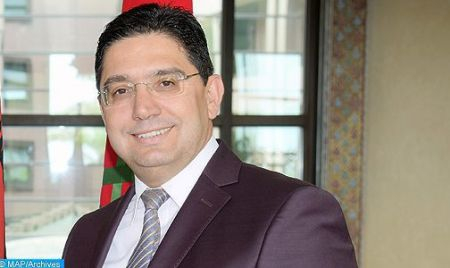FM Represents HM the King at Paris International Conference on Libya
Minister of Foreign Affairs, African Cooperation and Moroccans Abroad, Nasser Bourita, represents HM King Mohammed VI at the International Conference on Libya held Friday in Paris. The objective of this conference will be to provide international support for the continuation of the political transition underway and the holding of elections according to the planned schedule, according to a press release from the French Presidency. Morocco’s participation in this international conference is a continuation of its support for efforts to bring together the different views of the Libyan parties in order to establish peace, harmony and stability in this brotherly Maghreb country. The conference, which is being held for the first time in a format expanded to all of Libya’s neighbors, “also aims to support Libya in its request for the withdrawal of foreign forces and mercenaries,” says the Elysee, adding that on the economic front, the conference will “recall the need to unify Libyan financial institutions and implement a fair and transparent distribution of wealth in the country”. Finally, “on the humanitarian front, the conference will reaffirm the collective commitment to strengthen the support of the international community to meet urgent needs and fight human trafficking,” adds the same source. This international conference comes one month before the holding of general, presidential and parliamentary elections (in December and January), supposed to bring hope of stabilization to a country that has been in chaos for a decade. After years of armed conflict and regional divisions between east and west, a new interim government was appointed earlier this year, under UN auspices, to lead the transition to general elections. For the international community, the holding of these polls on their date is decisive to get the country out of the political and security crisis. This is a position fully supported by Morocco, which spares no effort to help the Libyan parties reach an agreement to establish political stability in the country. Moreover, the role of the Kingdom, thanks to the leadership and guidance of HM King Mohammed VI, is highly praised and appreciated both by the international community, led by the United Nations, and by the Libyans themselves, as evidenced by the intense diplomatic activities in Morocco of Libyan officials. Morocco has hosted a series of rounds of Libyan dialogue marked in particular by the 2015 Skhirat political agreement, which laid the foundations for reconciliation between the various protagonists and is considered the basic reference for any political settlement of the Libyan crisis.

